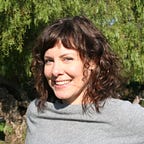White folks, we have to face our shame
Between the public, daylight murder of George Floyd by Minneapolis Police and Amy Cooper’s embarrassing freak out on Christian Cooper, Black people I look up to, respect and love are DONE with white people right now. I don’t blame them.
I’m ashamed of the behavior of white people. I’m ashamed to be white. And I know I’m not alone. Because shame doesn’t like to be spoken or seen, well-meaning white people — white people who would claim to “not be racist*” — do one of two things when atrocities enacted by white people come to light:
- Cry outrage and disgust around “those bad white people that are nothing like me because I’m a good white person;” or
- Go quiet and bury the shame deeper.
Neither of these approaches are going to heal us of our toxic white conditioning, and until we heal from our whiteness en masse, violence against Black, Indigenous people of color will continue to the detriment of our humanity. Unless we’re actively confronting and disarming our white conditioning, we are complicit in racial violence.
White supremacy is a disease that infects white people, but threatens the safety and lives of Black, Indigenous, people of color. Amy Cooper’s behavior is not that of an emotionally stable person. That police officer with his knee on the neck of George Floyd is really really unwell. These people must be held accountable for the harm they’ve done, but when we only punish and demonize them, we’re not addressing the underlying white conditioning that drove them to do harm.
As Ava DuVernay said when asked in this CBS interview about Amy Cooper’s behavior, “There’s a brokenness there…We (Black people) take on the emotional labor of racism and it is not our job to explain to white folk how to fix their broken selves.” She is right and far from the first Black genius to try and get through to white people that only we can fix ourselves and each other.
We need a restorative justice framework for white people if we’re ever going to end white supremacy.
The closest I’ve experienced of a restorative justice framework for white people comes from Resmaa Menakem, April Harter, the UnTraining, Beyond the Culture of Separation, Stronghold, Sandra Kim, Tada Hozumi, and Kazu Haga. I’m fighting my urge to perform my antiracism on social media** to prove to the people of color in my feed that I’m one of the “good” white people (It’s not their job to absolve me of my whiteness) and will instead lean deeper into these resources, teachers and learning communities of other white antiracists even more right now.
As a very smart woman in my UnTraining group said this weekend, “I can hate whiteness*** and love myself.” In fact, exposing and disarming my whiteness — and facing my shame around it — is how I’m learning to love myself — the self under my pale skin. Just because I lack melanin, doesn’t mean I have to lack the moral fortitude to dedicate my life to ending white supremacy in myself and encourage the white people I love to do the same. We can know better and do better than the white people who came before us. Not only for Black, Indigenous people of color, but for ourselves and our children.
*Not racist is passive. To be actively against racism, we must work to be antiracist every day.
**Some may see me writing this as performative, and I want to be clear that I wrote this as a way for me to sort my feelings and connect with other white antiracists who might be struggling with not knowing what to do or feel right now. I welcome constructive dialog about this because I’m often unsure about how to use my voice authentically AND constructively.
***By whiteness, I’m referring to the invented social construct that rewards those deemed white and oppresses those that aren’t.
